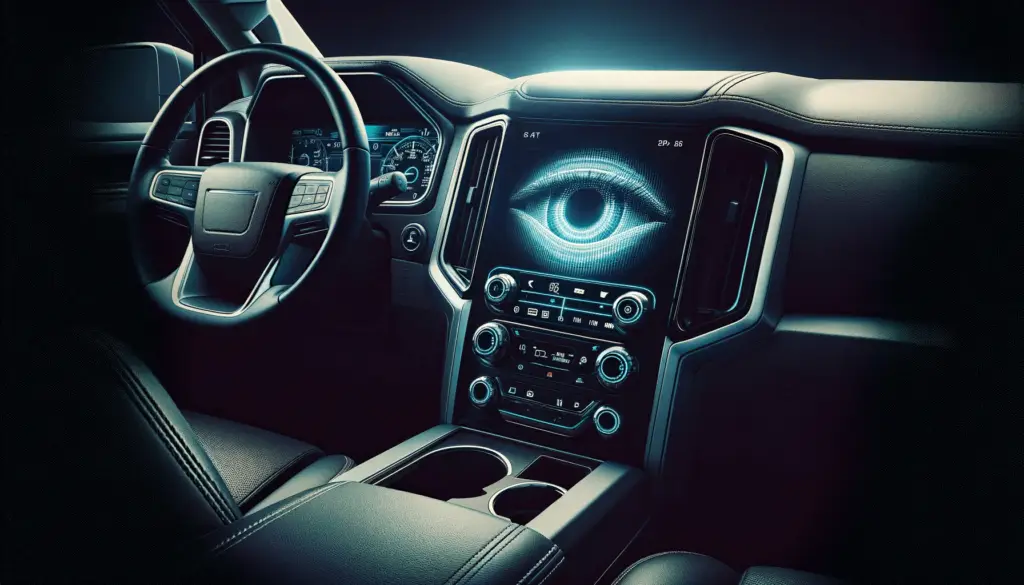Secrets on Wheels:
The Truth of Car Data Surveillance

Ever wondered if your car knows you better than you think? Welcome to the truth of car data surveillance where your vehicle is not just a mode of transport but a connected hub of personal data collection.
Introduction
Imagine a typical day where you’re driving to work. The sun is shining, your favorite song is playing, but what you might not realize is that your car is busy collecting data – a lot of it. Your location, speed, music preferences, and even your driving habits are all being logged. This scenario isn’t futuristic; it’s happening right now in the car parked in your driveway.
Cars today are more than just vehicles; they are sophisticated data collectors, akin to mobile computers. This eye-opening reality, initially brought to light in a thought-provoking article by The Washington Post, raises serious questions about privacy, data security, and the implications of such extensive car data surveillance and collection.
The Data-Driven Road Trip
Your vehicle, a modern marvel of technology, is constantly gathering a wide array of data. From the mundane to the intimate, it’s all recorded: where you shop, how fast you drive, the weight of the people inside, and even when you buckle up.
Consider this: every time you enter your car, it adjusts to your preset preferences, a convenience that comes with a side of data collection. Your car’s infotainment system, learning from your past selections, plays your favorite tunes, while the navigation system suggests routes based on your driving history. All this information, while enhancing your driving experience, also creates a comprehensive profile of your personal habits and preferences.
But it’s not just about convenience. This data has immense value – to car manufacturers, insurance companies, and even marketers. It opens a window to your personal life, providing insights into your behavior, preferences, and habits.
Diving deeper, your car’s data collection goes beyond just what’s on the surface. It tracks engine performance, tire pressure, oil life, and battery health, constantly sending this information back to the manufacturer. This helps them in predictive maintenance and improving future car models, but at what cost to your privacy?
The Future of Technology, What If?
Now, imagine in the near future, vehicles might also start monitoring more personal health-related data, like your heart rate or fatigue levels. While current technology primarily focuses on indirect methods such as monitoring driving patterns to infer fatigue, the prospect of cars directly measuring physiological signs isn’t too far-fetched. Advanced systems could potentially monitor the driver’s heart rate, stress levels, and even suggest breaks if signs of fatigue or high stress are detected. This kind of technology, while potentially improving driver safety, also raises further privacy concerns.
Moreover, connected cars, which can communicate with other devices and networks, take this data game to a whole new level. They can interact with your home automation systems, syncing with your schedule and preferences. This interconnectivity, while offering unprecedented levels of comfort and efficiency, also raises significant security concerns. What if this sensitive vehicle data collection falls into the wrong hands?
This leads us to a critical junction in our data-driven road trip: the crossroads of convenience and privacy. As our vehicles become smarter and more interconnected, the amount of data they collect and share increases exponentially. It’s not just about where you travel, but an intricate web of information mapping your entire lifestyle.
The future of automotive technology promises even more integration and data collection. Self-driving cars, for example, will rely heavily on data to navigate and make decisions. The data footprint of our journeys will grow larger, and with it, the need for robust privacy safeguards and transparent data handling practices.
As we navigate this data-driven landscape, it’s essential to stay informed and aware of the digital trails our vehicles are leaving behind. Understanding the scope and implications of car data surveillance is the first step towards taking control of our automotive privacy. The road ahead is paved with data; it’s up to us to decide how we travel it.
Privacy in the Driver’s Seat of your
As we delve deeper into the world of automotive advancements, a pivotal concern emerges: privacy. This isn’t just a hypothetical worry but a real issue highlighted by investigations like those from The Washington Post, revealing the intricate complexities of data ownership and privacy in our vehicles.
Think about the vehicle data collection that goes on – from where you travel to how you drive. It’s a treasure trove of information that, in the wrong hands, could become a tool for unwarranted surveillance. Car manufacturers, for instance, might see an opportunity to monetize this data by selling it to third parties. This isn’t a futuristic scenario; it’s a reality unfolding in the present day.
Take, for example, the growing trend of insurance companies using driving data to personalize premiums. By analyzing how you drive, they can tailor your insurance costs. This practice, known as usage-based insurance, is already in place in various forms across the globe. While it offers benefits like potentially lower premiums for safe drivers, it also raises significant privacy concerns. The data that makes your insurance cheaper might also paint a detailed portrait of your daily life.
The legal landscape is trying to keep pace with these technological leaps. In regions like the European Union, regulations like the GDPR offer some level of protection by controlling how personal data is handled. However, in many other parts of the world, including the United States, specific laws governing automotive data privacy are still in their infancy, leaving gaps in consumer protection.
Are We Overly Connected?
The advent of connected and autonomous vehicles adds another layer of complexity. These cars not only collect data but also interact with external networks and devices, amplifying the potential for data breaches or misuse. It’s not just about where you drive anymore, but about an interconnected web of information that could reveal much more about your life.
In this evolving narrative of cars and data, we, as consumers, find ourselves at a crossroads. While we embrace the benefits of modern vehicles, we must also be cognizant of the privacy implications. Being informed about the data our cars collect, understanding how it might be used, and advocating for stronger privacy measures are steps we can take to ensure our data doesn’t drive away without our consent.
As we journey through this era of automotive innovation, the conversation around data privacy becomes increasingly crucial. It’s a dialogue that involves not just car manufacturers and policymakers but us, the drivers, who need to stay informed and proactive in safeguarding our digital footprint in the driver’s seat.
Navigating the Future of Automotive Privacy
As we cruise into our more connected future, the conversation around automotive privacy is only going to get louder. Companies like TechCrazies are at the forefront, offering advice and solutions for digital security in our vehicles.
But it’s not just about what companies can do; it’s also about consumer awareness and action. Understanding the kind of data your vehicle collects and how it can be used is the first step. From there, you can take proactive measures to protect your privacy – whether it’s adjusting your car’s settings, being cautious about what information you share, or staying informed about your rights as a consumer.
Conclusion
The journey through the landscape of car data privacy is both fascinating and fraught with challenges. Our cars, integral to our daily lives, double as repositories of our personal information. Being aware of this reality and taking steps to manage it is crucial. For those looking to delve deeper, the original article by The Washington Post and resources provided by TechCrazies offer a wealth of information and guidance on navigating this complex issue.
